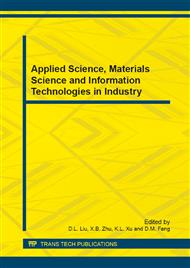p.1740
p.1744
p.1748
p.1752
p.1756
p.1760
p.1765
p.1769
p.1773
LabVIEW-Based Design of Virtual Instruments and R&G of Virtual Experimental System
Abstract:
With the popularization of network technology, the computer technology is developing rapidly coupled with the emergence of virtual instrument technology. In this context, virtual experiment, an effective complement to the development of the traditional experimental method, has very broad spectrum of application in the field of education, measurement, and even other research areas. Thus, virtual experiment has become an important future development of experimental teaching. Based on analysis of the history and current status of the existing virtual laboratory at home and abroad, as well as the technologies used to accomplish a virtual experiment, this thesis makes a comprehensive study to analyze the construction of the virtual experiment system, including the basic theory of its establishment, the network environment, application classification, the specific tectonic model and technical methods and its development and applications.
Info:
Periodical:
Pages:
1756-1759
Citation:
Online since:
February 2014
Authors:
Keywords:
Price:
Сopyright:
© 2014 Trans Tech Publications Ltd. All Rights Reserved
Share:
Citation:


